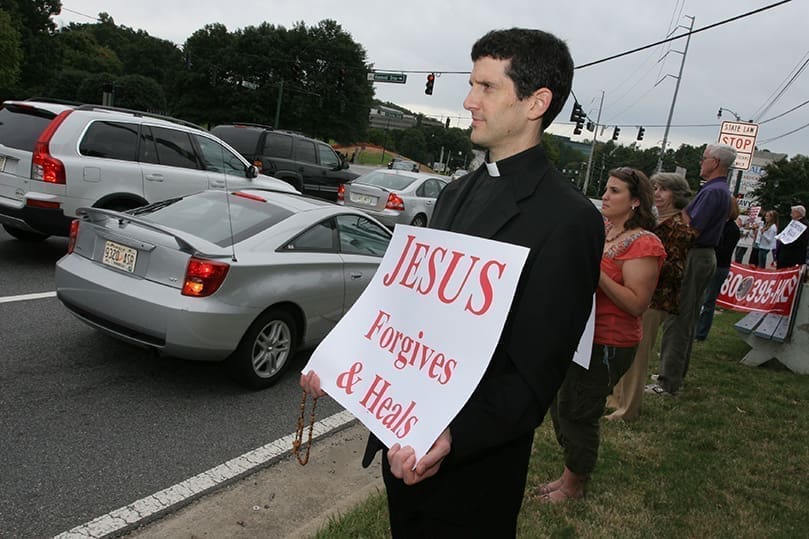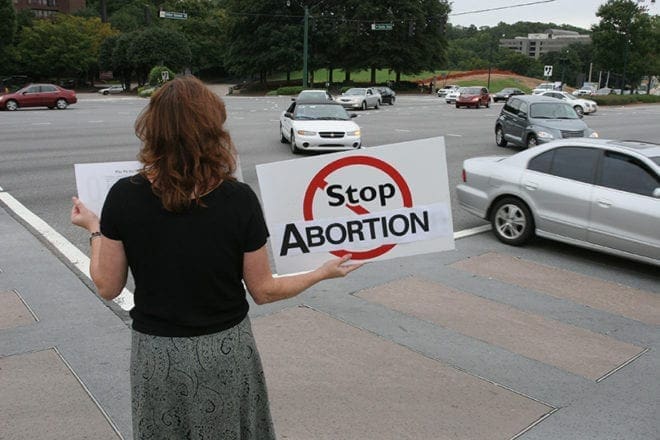 Photo By Michael Alexander
Photo By Michael AlexanderAtlanta
Signs Are Just One Way Church Shows Respect For Life
By STEPHEN O'KANE, Staff Writer | Published October 29, 2009
As early as 22 days after conception, a fetus produces a beating heart. A few weeks later, its stomach, esophagus and kidneys, among many other organs, begin developing as well.
It is the belief that these young fetuses are fully human that drives Catholics throughout Georgia to stand up and support the many activities of Respect Life Month, celebrated every year during October.
“Respect Life Sunday, this year celebrated on October 4, is a day set aside for Catholics in the United States to reflect with gratitude on God’s priceless gift of human life,” wrote Cardinal Justin F. Rigali, chairman of the U.S. Conference of Catholic Bishops’ Committee on Pro-Life Activities, in his statement on Respect Life Sunday.
Respect Life Sunday, as designated by the USCCB, is celebrated each year on the first Sunday of October and officially starts a new year in the Respect Life Program.
“It is also an occasion to examine how well we, as a nation and individually, are living up to our obligation to protect the rights of those who, due to age, dependency, poverty or other circumstances, are at risk of their very lives,” the cardinal continued.
Each year hundreds, even thousands, gather on the streets of their neighborhoods to respectfully but powerfully share their thoughts on the issue of life through an activity called a Life Chain.
Life Chain, now in its 22nd year, is meant to be a peaceful, prayerful and non-confrontational way to show support for unborn babies and their mothers. Typically, people stand in silence along a heavily trafficked road in their neighborhood, praying and holding signs with life-affirming messages.
Signs include messages such as “Abortion Hurts Women,” “Pray to End Abortion” and “Life—The First Inalienable Right.”
More than 50 Life Chains were held throughout Georgia Oct. 4, from Savannah to Peachtree City to Alpharetta.
The first Life Chain was held in 1987 by a pro-life ministry in Yuba City, Calif. Half of the churches of Yuba and Sutter counties held “Abortion Kills Children” signs.
According to LifeChain.net, a Web site organized by Sharron Albertson, the Texas Life Chain coordinator, in September 1989, 101 churches in Bakersfield, Calif., built the second Life Chain with 7,500 participants.
Not long after, many other California cities followed, including Riverside, Fresno and Sacramento, as well as San Diego, which saw as many as 320 churches with 28,000 people participating.

Standing at the intersection of Ashford Dunwoody Road and Hammond Drive, Noreen Coughlin, coordinator for the DeKalb County chapter of Georgia Right to Life, holds up signs before passing motorists. Photo By Michael Alexander
But the Life Chain is just one portion of the month’s events. Several hundred people also participate in “40 Days For Life,” a community-focused initiative drawing attention to abortion through a three-point program that includes prayer and fasting, peaceful vigils at abortion facilities and grassroots education.
The program takes a determined, peaceful approach to revealing to local communities the consequences of abortion in their own neighborhoods.
Two vigils were held this month as part of 40 Days for Life, one at the Feminist Women’s Health Center in Atlanta and one at Abortion Services and Counseling in Marietta.
More than 200 cities in 45 states and five Canadian provinces planned to have 40 Days for Life campaigns.
“There are campaigns in at least 212 communities,” wrote David Bereit, 40 Days for Life national director, on its Web site. “Last fall’s campaign was conducted in 177 cities. This shows that support for the pro-life message is spreading—and that 40 Days for Life continues to have a positive international impact.”
According to the organization, the 40-day campaign is based on biblical narratives, where God used 40-day periods to transform individuals and communities. From Noah in the flood to Moses on the mountaintop to the disciples after Christ’s resurrection, it is clear that God sees the transformative value of his people accepting and meeting a 40-day challenge. The campaign began in 2004 in Texas.
Cardinal Rigali, in his Respect Life Sunday statement, said that unborn children remain the persons whose lives are most at risk. He believes discussion is as important as ever, particularly when a complete redesign of the American health care system is being debated in Congress and around the country.
“In the current debate over health care reform, it has become evident that a number of Americans believe that the lives and health of only some people are worth safeguarding, while other classes of people are viewed as not deserving the same protection,” he said.
“Such an attitude is deplorable, all the more so in the context of health care. Sanctioning discrimination in the quality of care given to different groups of people has no place in medicine, and directly contravenes the ethical norms under which Catholic hospitals and health care providers operate.”
This year’s Respect Life Month theme, “Every Child Brings Us God’s Smile,” comes from an observation by Pope Benedict XVI: “Every child … brings us God’s smile and invites us to recognize that life is his gift, a gift to be welcomed with love and preserved with care always and at every moment.”
In his statement, Cardinal Rigali said that people who need care are a gift to those around them, giving them opportunities to become less self-centered and more generous and compassionate.
“Children, and those who are dependent on us due to disability or age, offer us the opportunity to grow in patience, kindness and love” he wrote. “They teach us that life is a shared gift, not an encumbrance. At the end of life, we will be judged on love alone.”